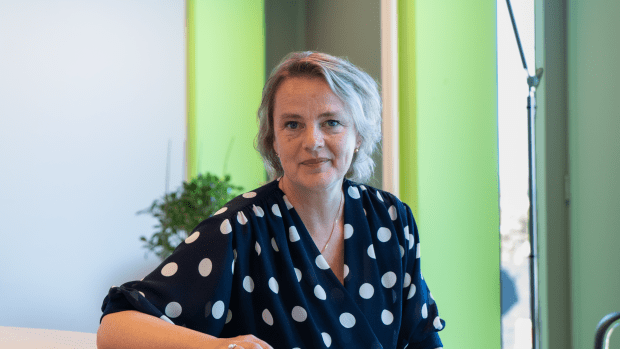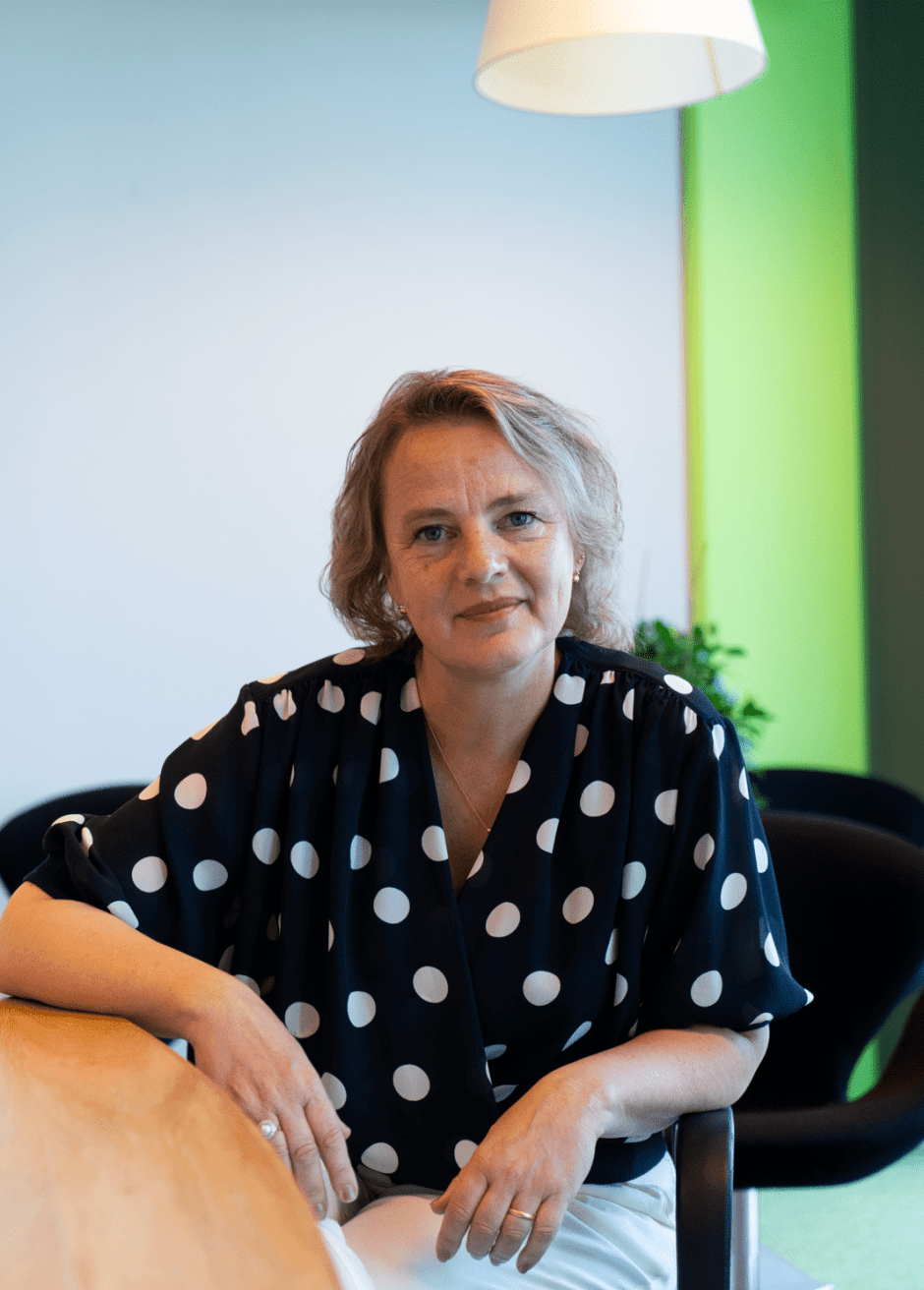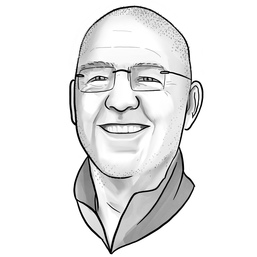
Edith Hooge: 'I am both educationalist ánd educational administrator'
Edith Hooge has been the new president of the Board of the always turbulent UvA for a month now. In the coming period, she wants to get to know as many people as possible. Today we get a taste of that. “We should try to bring together the different perspectives, away from the extreme views.”
On a crisp afternoon with a clear blue sky, Edith Hooge gives her first interview to Folia in her new capacity as college president. She was previously a member of the Board of Supervisors where she had been appointed by nomination and “by special confidence” of the participation council. That sounds auspicious for a university where relations with the student participation council are strained. She makes a relaxed impression, her cell phone on a phone cord around her shoulder and the agenda for the day on a piece of paper behind the phone case. “Look, here are my appointments.”
Like her predecessor, she lives on the Roeterseiland Campus (REC), a place where she already feels at home, although her boardroom still needs some decorating, she tells herself. Ideas galore, as it turns out. In the bookcases on one wall, a collection of interesting UvA theses might not look out of place, she thinks. Or perhaps some compiled paper copies of Folia issues from days gone by, to have UvA history always at the ready. For the other wall, her idea is already fixed: “There I’ll hang a large map of Amsterdam that also shows all the UvA locations. Then I’ll use colored thumbtacks to indicate which locations I have already visited.”
By now there are several: the Acta dental faculty on the Zuidas, PPLE on Plantage Muidergracht, the USC on Science Park and, of course, the ABCD buildings on the Roeterseiland campus. “It feels like coming home,” she says. “And especially since I worked for decades outside the city, such as in The Hague, where I was president of the Education Council, and in Tilburg, where I was a full professor.”

It has been a while since Edith Hooge (Arnhem, 1967) studied pedagogical, andragogical, and educational sciences at the UvA, then called the PAOW program, but the ‘A’ has since been dropped. She attended lectures and did doctoral research in the 1980s and 1990s at Prinsengracht, on Bickerseiland, and at the Kohnstamm Institute. “Those buildings were scattered around the city. Very different from the campuses we have now.” It does her good to see how the UvA has also improved in its buildings, she says. “It all looks very nice,” she says with satisfaction, opening the upright window in her office a bit on this hot day.
You have been at the helm of the UvA for a month today. What have you noticed most?
“Several things. I have since met many fun, smart, and engaged people who are proud of what they do and what the UvA is. From the students of Room for Discussion, who do everything in their power to maintain open debate at the UvA, to the Law Hub, where students and scholars work on law in innovative ways, to the service departments that are, after all, the eyes and ears of the UvA.”
“At the same time, I have also seen and noticed that many people are very affected by what has been happening in the world and at the UvA in recent months. I, too, find it terrible to see: people who feel threatened, who don’t feel safe or feel at home on campus, or who seem to be dropping out. We are going to work hard to improve that, and that is why it is also good that work is now underway to tighten the framework for cooperation with external organizations.”
Like your predecessor, you are an educator by background. Why is that a good background to run a university?
“I am an educator, but I often add: I am also an educational administrator. So I always ask myself emphatically how you can ensure that an educational institution is run as well as possible. You can only do that if you have a good sense of what a university is and should be and what its core mission is, what do curricula look like, how to deal with accreditations. In my role, you have to be able to take the perspective of students and faculty/researchers. I can do that.”
There are many complaints about the quality of education. Should it and can it be better?
“Education can always be improved and needs permanent maintenance. There are two things you must always keep in mind: education is predominantly the work of people and good education depends on teamwork. Digitalization, for example, leads to good innovations in education, but social relationships and interactions are at least as important. In pedagogy I learned: first the relationship, then the performance. And so it is. In addition, Teaching & Learning Centers (TLC) are very important from the point of view of teamwork. There, teaching expertise is jointly developed and shared. Making expertise accessible is not only good for the quality of education, but also fun to do.”
Will you be teaching at the UvA yourself, and if so, what?
“I definitely want to do that, I can, for example, lecture in educational sciences on policy, administration, and public governance.”
I read in the Dutch newspaper FD that you are “incredibly straight” and don’t like “bullshit.” Does that also characterize your governance style?
“I don't think anyone likes bullshit, but I am indeed pretty direct and straightforward. I don't like games or hidden agendas. In conversations, I try to get a clear understanding of what it is my interlocutors are after and what they want to achieve with the conversation. We may not be heading for the same outcome, in which case I want to talk about it.”
In the current debate over whether or not to sever ties with Israel, the UvA and the protesters indeed seem to be heading for different outcomes. How do you view that?
“We all have different perspectives from which we look at this discussion. At the roundtable discussions we are currently having, everyone can make their point. We should try to bring the different perspectives together, away from the extreme positions. Especially listening carefully to each other's experiences and views seems very important to me right now.”
Upon arriving at the UvA, you immediately received a vote of no confidence. The CSR wants the Executive Board to resign because of its “complicity” in the war in Gaza. What is going to happen?
“As a college, we must and want to make an effort to restore trust with the SRC. By having conversations and exchanging views, we should succeed. We are going to get help from a mediator in this and I hope that we can reach a solution that will also be supported by the next SRC, due to take office in August.”
I read that you think it would be nice to explore other forms of participation, alternative ways for students and staff to have their voices heard. What kinds of things are you envisioning?
“I think it would be nice to address that during the Opening Academic Year on September 2nd. Formal co-determination serves as a foundation, but does not mean that there are not other formal and informal ways to make everyone at the UvA part of the university community.”
Is the existing employee participation system, which is so active, still tenable?
“The employee participation system is part of what I call ‘the university's golden triangle’: the executive board, supervisory board, and employee participation. That implies that co-determination also shares responsibility for the university. Participation provides a counterbalance and that is good. In itself, there is also nothing wrong with activism but the responsible role of each of the components of the golden triangle does require a certain degree of role stability in its interpretation.”
A new college year is upon us with many new international students. Will the new Balanced Internationalization Act help curb the number of these students?
“Let’s see how the new law turns out, but it should be clear that the UvA has a solid international, bilingual orientation, is proud of that, and wants to maintain that, if necessary with a fixus on some English-language tracks.”
A new administration takes office this week that wants to make massive cuts to higher education. Are you worried?
“I am definitely worried. I wasn’t at the demonstration in Utrecht on June 22nd for nothing. We should not pretend that nothing is going on, because something is going on. We are looking at a fast-moving target of the upcoming government at a time when it is not yet entirely clear how those cuts will work out. The proof is in the pudding, so to speak.”
How will you be visible at the UvA in the coming years?
“I am and will remain an administrator on the move, even after my induction period. I will continue to see as many people as possible, attend meetings and debates, and seek out connections. Often that can simply be done on my bicycle; I am a cycling administrator.”

